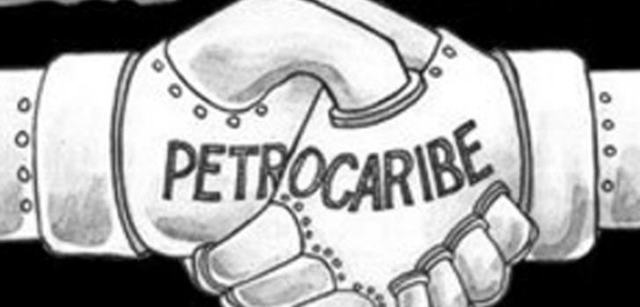 Venezuela’s oil deal with the Bahamas and 12 Caribbean nations, including Cuba, raises more questions than it answers.
Venezuela’s oil deal with the Bahamas and 12 Caribbean nations, including Cuba, raises more questions than it answers.
With Venezuelan oil currently priced at an average of about $40 a barrel (compared to about $60 for benchmark North Sea oil), the deal would let us finance 30 per cent of our $100 million-a-year fuel bill over 15 years at only 2 per cent interest.
If the price rises above $50 a barrel, the interest rate drops to 1 per cent and the amount that could be financed goes up to 40 per cent over 25 years. If the price hits $100, we would be able to finance half of our oil bill.
Barbados and Trinidad turned this offer down, for political and commercial reasons. Trinidad said it’s own oil industry could be put at a competitive disadvantage. Barbados was concerned about Venezuela’s effort to link the region to a political and trade pact separate from the US-backed Free Trade Area of the Americas.
But – just like Foreign Minister Fred Mitchell on the CSME – Trade Minister Leslie Miller can see no downside for the Bahamas to the Petrocaribe accord, despite the fact that no impact study has been undertaken.
Once again we are just going with the flow, ostensibly in the interest of lower gas prices. But Venezuelan oil minister Rafael Ramirez says there are no discounts: “This is the market price. What we have here are more flexible financing conditions.”
The Petrocaribe deal is a fiery mix of economics and politics, and the potential hazards are even harder to grasp than our proposed membership in the Caribbean Single Market & Economy was. What is clear is that the government is not being overly helpful, which means that it either hasn’t thought the matter through, or is hiding the issues.
According to President Hugo Chavez, Venezuela’s state oil company – PDVSA – will set up a subsidiary, based in Cuba, to transport oil around the region in Venezuelan tankers. But only state companies will be able to buy from this Petrocaribe distributor.
That means the Bahamas will have to create a new public bureaucracy to take advantage of the Petrocaribe agreement – something for which the government has allocated a token $40,000 in its most recent budget.
“The agreement is vague on many points and tells only half the story,” one analyst told Tough Call recently. “The oil will be bought by a government agency which will act as the wholesaler/middleman just as Shell, Esso and Texaco act now. How much will that agency charge for its service? Transportation, refining and storage add about 50 per cent to the wholesale cost of fuel. And then there is the retail mark-up.”
And there is also the question of whether the multinational oil companies will be shut out of the market altogether. That is a clear objective of the Chavez regime, which wants to reduce American influence in Latin America and the Caribbean to set up a new socialist bloc with Cuba. In fact, the Petrocaribe agreement calls for political curbs on free enterprise in the region.
According to Dr Michael Weinstein of Purdue University in the United States, “with the exception of Cuban President Fidel Castro, with whom he cultivates friendly ties, Chavez is the only Latin American leader who stands for a model of development that deviates significantly from the broad Western consensus on market democracy.”
Oil is the basis of Chavez’s power. His fortunes changed dramatically as the price of oil began its recent rise, and general economic conditions in Venezuela improved. Now his regime is spending oil revenues on social programmes, a military build-up and a variety of diplomatic initiatives like Petrocaribe.
The Venezuelans told reporters in Caracas last month that “preliminary studies” show oil prices might fall by up to $6 a barrel in the region, if third-party companies like Shell, Esso and Texaco were cut out by the government-to-government Petrocaribe deal. There is even talk of a regional fuel retail brand, but it is unclear just how this will play in the Bahamas.
“All our gas stations are tied by lease or sales contract to one of the big three oil companies,” a local analyst said. “Who will they be tied to in future? The government? Will the government buy from the big three their heavy assets such as terminals at Clifton Pier? And at what cost? These assets are very maintenance intensive and carry high operating costs.
“What about the important fuel sales to the aviation industry? Will the multinational companies be interested in continuing if they are shut out from the gas station business? Or will Venezuela take over this aspect too – a prospect that may not make international airlines happy, since they often have worldwide fuel contracts.”
Others say the Bahamas has special leverage because of the mothballed BORCO refinery on Grand Bahama, which is owned by PDVSA. This facility is currently used only as a storage and transhipment terminal, but it could be re-commissioned as part of the Petrocaribe deal.
Refineries must be specially configured to process Venezuelan heavy crude, and BORCO was set up to do this before it closed in 1985 during a world oil glut. A barrel of Venezuelan crude yields about 65 per cent finished products such as gasoline and kerosene (compared to 95 per cent for Saudi light crude). But getting that 65 per cent requires expensive and complex refining equipment.
Venezuela is OPEC’s third-largest producer. It already had preferential deals with several countries in the region under the 1980 San Jos? Accord. Venezuela and Mexico supplied 11 Caribbean and Central American nations with subsidized oil under this programme. And more recently, the Caracas Accord provided oil on concessionary terms to the Dominican Republic and Cuba.
For various political and economic reasons, the Bahamas was never a part of these arrangements. In the past, Venezuela’s foreign policy opposed Cuban communism. Now, Cuba is a key ally and both Chavez and Castro are working to build an anti-American front within the region – something that has been helped along by Washington’s preoccupation with Iraq and Afghanistan.
So, in a kind of mini cold war, the United States is seeking to contain Chavez, who was described by US Secretary of State Condoleezza Rice earlier this year as a “negative influence” in the hemisphere. And Chavez has threatened to cut off oil exports to the US if Washington moves against him. That is the geopolitical subtext to the Petrocaribe document we just signed.
According to the Venezuelan opposition (www.vcrisis.com), “Chavez is making Caribbean states an offer they can’t refuse. The real price will be high, however. And with the potential threat of a Venezuelan oil cutoff – which actually happened to the Dominican Republic not long ago over a different dispute – there’s some unusual pressure ahead.”
And that leads to another big question about the Petrocaribe deal – security of supply. As one analyst put it: “We will be relying on deliveries from a single source. What if physical problems or political turmoil curtails production there (as it has in the past)? The multinational oil companies produce and refine in many countries.
“What about reliability and efficiency of deliveries? The multinationals have been in this business a long time. Can we be certain of the distribution capabilities of Venezuela, which is mainly a producer selling to wholesale refiners and distributors? In the best of circumstances, there are likely to be temporary shortages and dislocations.”
THE GREAT GAME
To conclude this analysis, we must look at the wider context of petroleum politics. Recently, former US secretary of state Henry Kissinger pointed out that control of global energy resources was the central “geopolitical game” of our day.
“The amount of energy is finite, up to now in relation to demand, and competition for access to energy can become the life and death for many societies,” he said. And many other experts agree.
“I think that the Bush administration is seeking to undermine Chavez, and I’m sure they’re working on that night and day,” says Professor Michael Klare of Hampshire College in Massachusetts, who is sympathetic to Chavez.
Meanwhile, the US – with only 5 per cent of the world’s population – consumes 25 per cent of global oil output, and is the biggest oil importer. Venezuela currently supplies about 15 per cent of that seemingly insatiable demand.
Some experts believe that the “final scramble” for oil has already begun. According to one newspaper account: “Never has the competitive pursuit of untapped oil and gas reserves been so acute, and never has so much money as well as diplomatic and military muscle been deployed in the contest to win control over major foreign stockpiles of energy.”
That’s because the global supply of energy is not growing fast enough to keep up with soaring demand, particularly from China, India and the United States. And the Organisation of Petroleum Exporting Countries has already warned that it will be unable to meet demand projections in 10-15 years.
With prices rising all over the world and serious shortages in the offing, every major consuming nation is under increasing pressure to maximize its share of the available energy supply. Inevitably, these pressures will pit one state against another in the competitive pursuit of oil and natural gas.
So that is the geopolitical environment we find ourselves in today. But despite the many complex and dangerous factors at play here, we have heard next to nothing from our government other than simplistic diatribes against “profiteering”.
In the meantime, we are waiting to hear from a special advisory committee the government appointed recently to review fuel usage and pricing policies. This body includes former Shell Bahamas executive Vincent Coleby, consultant Gerry Wirth, and independent MP Pierre Dupuch.
Their report is expected soon.
The views expressed are those of the author, and not necessarily those of the Nassau Institute (which has no corporate view), or its Advisers or Directors.
This article was first published in The Tribune on Wednesday, July 13, 2005.
The column ‘Tough Call’ by Larry Smith is published in The Tribune every Wednesday and is reprinted here as a courtesy. Mr. Smith founded and successfully grew an advertising agency over 20 years. Under his direction Media Enterprises diversified into short-run commercial printing and publishing, and is now the largest non-fiction book wholesaler in the Bahamas. He has 30 years experience as a journalist and publicist and has contributed numerous articles and columns to the Bahamian press. A former reporter at the Nassau Guardian, local correspondent for Reuters and editor at the Bahamas News Bureau, he conceived and edited the Bahama Almanac (published 2000 by Media Enterprises), wrote the commentary for Mike Toogood’s Portrait of an Archipelago (published 2004 by Macmillan Caribbean), and edited the Bahamas Environmental Handbook (published 2002 by the government). In 2003 he took a year’s leave of absence from Media Enterprises to lead a transition management team at the Nassau Guardian after the paper was acquired by local investors. After leaving the Guardian he was contracted by the Tribune as online manager/editor and columnist. He has a degree in political science and journalism from the University of Miami.


